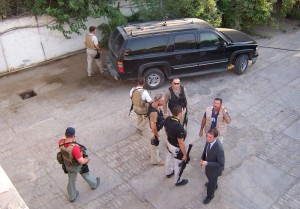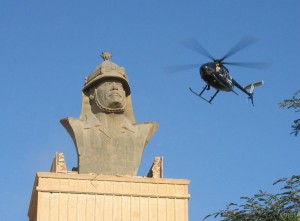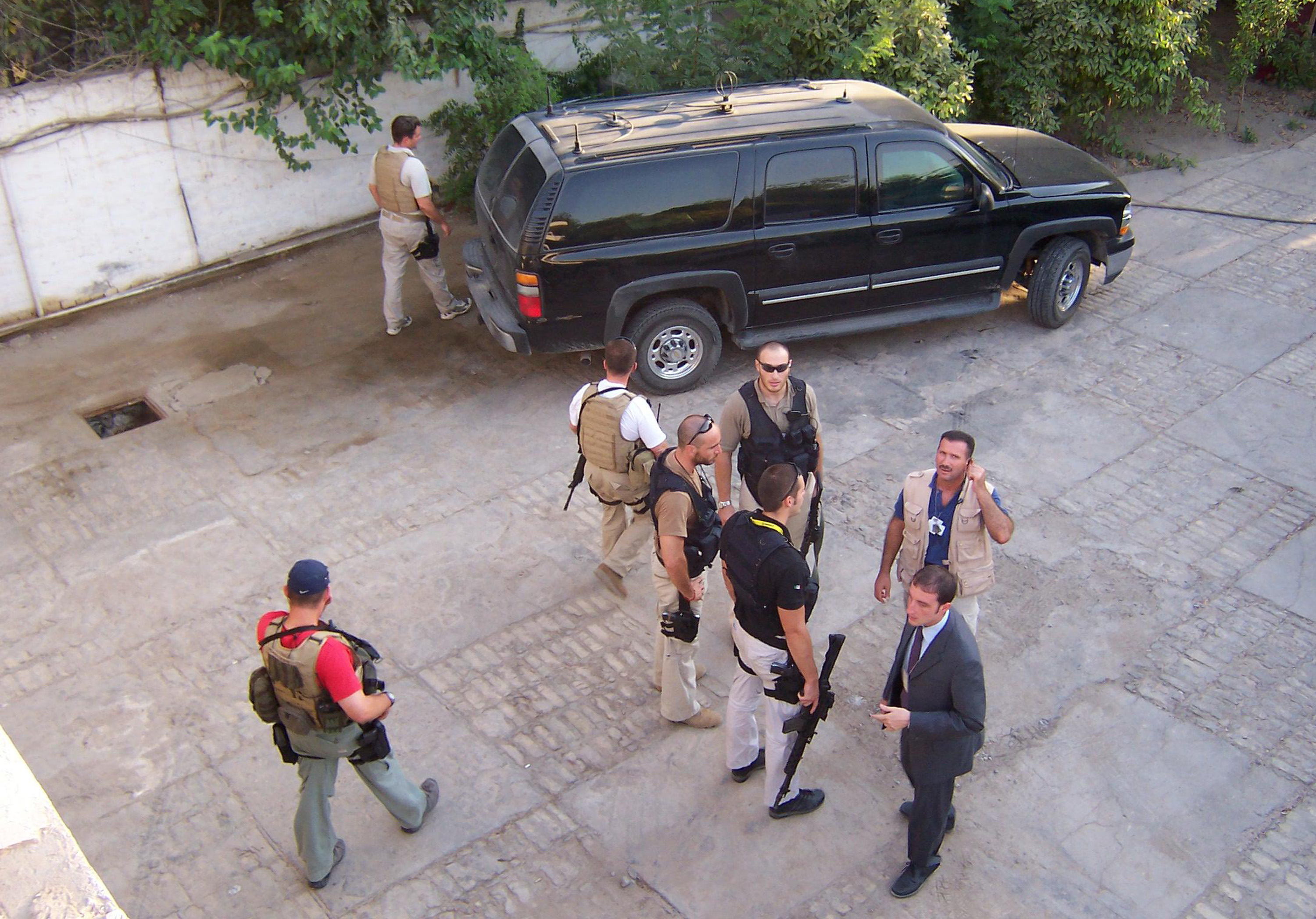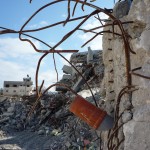When hurricane Katrina struck New Orleans on August 23, 2005, America saw the largest deployment of mercenaries on its own soil since the War of Independence. 150 soldiers of the infamous private military company Blackwater USA, now named Academi (and previously known as Xe and Blackwater Worldwide), were on the ground almost immediately after the hurricane hit. Contrary to American law, the mercenaries deployed and operated without federal authorization. Armed with automatic weapons and clad in black combat gear, the contractors of Blackwater patrolled the streets of New Orleans in armored SUVs and engaged hostile gangs at their company’s own behest, until the governor of Lousiana officially contracted their services and retroactively deputized some of them.
They were followed shortly by other companies, such as DynCorp, Instinctive Shooting International and American Security Group. But they were often, in contrast to Blackwater, first contracted by private businesses, wealthy people who could pay for security or federal organizations such as FEMA, in a New Orleans torn to shreds by a natural disaster, before they were deployed. To understand how a PMC (Private Military Company) could act so independently and deploy on US soil on its own accord, one must look at the years previous to Katrina and the conflicts that made it all possible.

The wars in Iraq and Afghanistan caused the inception of the mercenary boom of the 21st century. (False) promises of $1000/day contracts made tens of thousands of mercenaries flood to the Middle East, some qualified, others not. Blackwater USA, to illustrate how major this boom was, reported a 600% growth in November 2004 from March the same year. They were paid $27.7 million in a no-bid contract for guarding the Coalition Provisional Authority (the de facto governor of Iraq at the time), Paul Bremer, in 2003. From June 2004 to March 2007, they were paid over $320 million. This pales in comparison to the $430 million Aegis made for the contract of coordinating the private security operations in Iraq, or DynCorp’s $1.44 billion for training the new Iraqi police force. The profits were immense and the mercenary business saw a boom unrivalled in western history since the Thirty Years’ War.
The public lynching of four Blackwater employed mercenaries by an angry mob in Fallujah on March 31, 2004, triggered a siege of the city by the 1st Marine Expeditionary Force and broadcasted its name across the world. More incidents followed, such as the Nisoor Square shootings in September 2007 were they shot and killed 17 civilians and the video depicting a Blackwater sniper shooting at alleged insurgents from a rooftop and exclaiming: “It’s like a fucking turkey shoot!”. Political leaders in Afghanistan have tried but failed to throw the private military companies out of their country, and the protests against them have been great in Iraq following the incidents (and many others) described above. A sizeable force of private security contractors (9,500 in October 2011) still remain in Iraq after the last Coalition combat troops left the country.
Considering that the total number of private contractors, including civilian (engineers, support personnel such as truck drivers etc), outnumbered the official American armed forces in Iraq in March 2011, it is evident that the US Department of Defense relies on them heavily. According to the Congressional Research Service in an analysis published in May 2011:
“DOD relies extensively upon contractors to support overseas contingency operations. As of March 2011, DOD had more contractor personnel in Afghanistan and Iraq (155,000) than uniformed personnel (145,000)”.

The American war apparatus is therefore directly dependent on the private military industry for its overseas contingency (Read: Operations in combat zones) operations, which is unique in the history of the most powerful military on earth. 52 % of their personnel in Iraq and Afghanistan were private contractors and most of the mundane tasks that a military needs to perform in order to operate have been outsourced. This despite the estimate that between $38 and $60 billion has been squandered by the private contracting firms (This includes civilian reconstruction) in Iraq and Afghanistan, and a private security contractor costs ten times as much as a regular United States trooper.
Companies such as Blackwater also give a substantial amount of money to lobbyist groups in America. It has been widely covered in American media how Eric Prince, the founder and owner of Blackwater, has contributed with money to the Republican Party and its candidates. This and his personal ties to a lot of politicians and military commanders explain, in part, why they have managed to secure lucrative contracts by the DOD and could deploy in New Orleans before it was officially sanctioned by the federal government.
But Academi/Blackwater is just one of many similar companies in the world today. PMCs are employed by companies and governments in war and conflict zones across the globe. Their assignments vary from close protection duties, to guarding pipelines and important installations, to espionage and transporting supplies. Though being under close scrutiny particularly in the United States in recent years, these companies continue to reap billions in profits and are allowed to operate outside the international rules of war established by the Genève convention. Not a single private contractor has been tried and convicted for crimes committed in Iraq to this day, despite there being hundreds of reported incidents involving private security contractors since the invasion, some with fatal results.
“The United Nations Working Group on Mercenaries has developed a new treaty that would ban contractors from core military functions”, according to Ms. Faiza Patel, who chairs the UN Working Group on Mercenaries, in an article published by her on September 25, 2012.
Though a treaty is certainly necessary to contain the mercenary companies and force them to abide by international law and respect human rights, it is highly unlikely to be accepted considering that it would involve the agreement and support of all the major mercenary employers. Today only South Africa bans mercenary companies altogether.
Several political reforms have been enacted in the last years, in America but also in countries such as Switzerland, to increase control over and the accountability of PMCs, but those based in countries without legislation still enjoy a kind of immunity.
As Faiza Patel argues in the article quoted above: “These firms, many based in the U.S. or Western Europe, operate like any business. If the market dries up in Iraq or Afghanistan, they move to the U.A.E. or Sudan”.
It is evident that the “fourth generation of warfare” will not only feature drone strikes and state sanctioned terrorism in the years to come, but also an increased usage of PMCs, unbound by traditional rules of war that give their employers unaccountability for the actions of their hired guns. The eradication of a village in Sudan in the way of an important pipeline, for instance, could maybe not be carried out by a conventional force like the US Marine Corps, but very well any of the hundreds of PMCs that exist in the world today.
Following this development of the early 21st century, it appears that moral values and human rights are subordinated the principles of profit. The question whether the international community as a whole will do something about it remains unanswered, however.
Text: Felix Österberg
Photo source: Flickr, by user jamesdale10. Licenced under Creative Commons Attribution 2.0 Generic.



